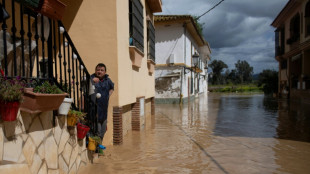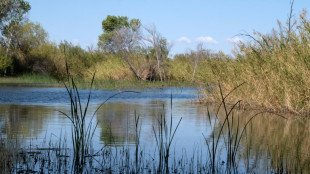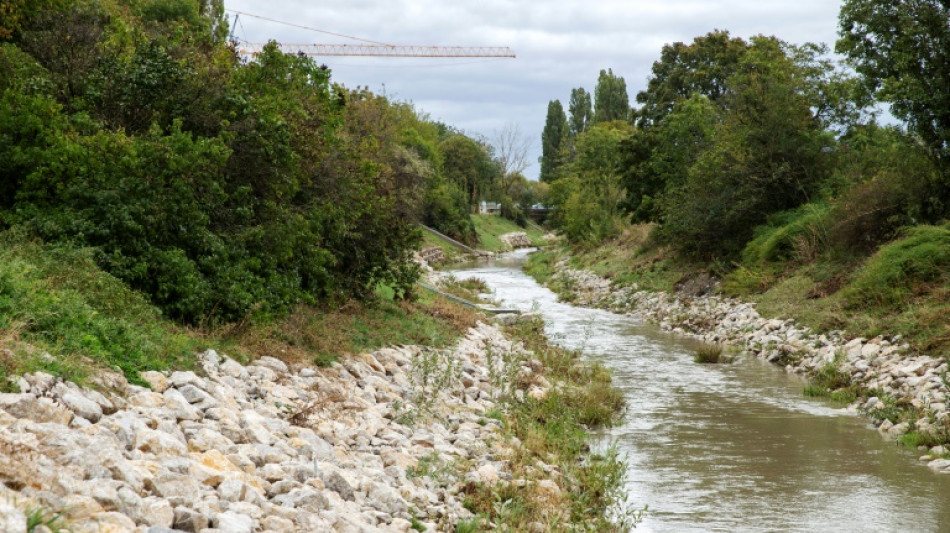
-
 Settlement champion Huckabee confirmed as US Israel envoy
Settlement champion Huckabee confirmed as US Israel envoy
-
Trump pauses tariffs for 90 days but hits China harder

-
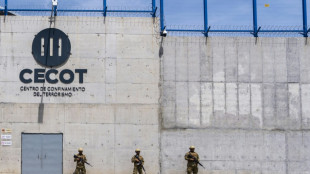 US federal judges halt deportations of Venezuelans under wartime law
US federal judges halt deportations of Venezuelans under wartime law
-
No direct LIV path to Masters but Ridley wants one elite tour

-
 UK cinemas fight viral 'chicken jockey' trend
UK cinemas fight viral 'chicken jockey' trend
-
Russia denounces brief detention of government employee in France

-
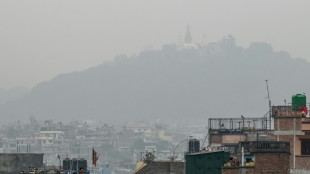 Nepal fights wildfires and pollution amidst drier winter
Nepal fights wildfires and pollution amidst drier winter
-
Jamaican speed merchant Thompson seeks fast progress in 2025

-
 'Horrible' Djokovic falls in Monte Carlo, first win for Alcaraz
'Horrible' Djokovic falls in Monte Carlo, first win for Alcaraz
-
Masters chief defends Cabrera invite after domestic violence convictions

-
 Pentagon chief in Panama vows to counter China 'threat'
Pentagon chief in Panama vows to counter China 'threat'
-
Trump's NASA chief pick says will 'prioritize' Mars mission
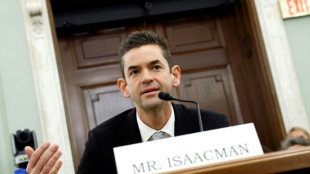
-
 Europe's first Universal theme park to bring 'joy to Britain': PM
Europe's first Universal theme park to bring 'joy to Britain': PM
-
Trump tells US to 'be cool' as China, EU strike back

-
 Djokovic crashes out in Monte Carlo, first win for Alcaraz
Djokovic crashes out in Monte Carlo, first win for Alcaraz
-
Over 120 dead in Dominican Republic nightclub disaster
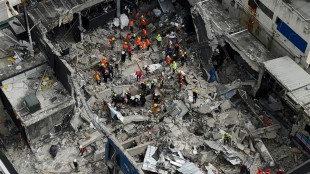
-
 Delta to trim capacity in light of weakening travel demand
Delta to trim capacity in light of weakening travel demand
-
Pressure builds on Afghans fearing arrest in Pakistan
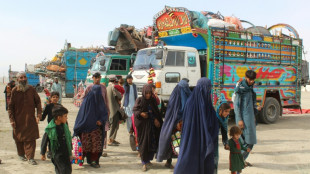
-
 From Freddy Kruegers to Peaky Blinders: a look at Ecuador's drug gangs
From Freddy Kruegers to Peaky Blinders: a look at Ecuador's drug gangs
-
Postecoglou says 'general sentiment' points to Spurs exit

-
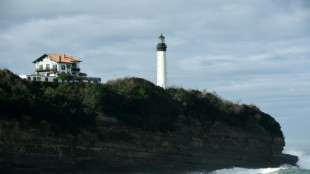 French group gets death threats over renaming of 'Negresse' district
French group gets death threats over renaming of 'Negresse' district
-
Beijing rejects Ukraine claim 'many' Chinese fighting for Russia

-
 Germany 'back on track' says Merz, unveiling new coalition
Germany 'back on track' says Merz, unveiling new coalition
-
France struggles to find new home for two orcas after park closes

-
 Alcaraz recovers from sluggish start to move into Monte Carlo last 16
Alcaraz recovers from sluggish start to move into Monte Carlo last 16
-
Trump trade war escalates as China, EU counterattack

-
 Stocks volatile, oil plunges as trade war cranks higher
Stocks volatile, oil plunges as trade war cranks higher
-
US Treasury chief defends tariffs, warns against aligning with China

-
 Beijing consumers mull spending habits as 'worrying' tariffs kick in
Beijing consumers mull spending habits as 'worrying' tariffs kick in
-
Stocks, oil plunge as US, China crank up trade war

-
 Onana 'one of worst goalkeepers in Man Utd's history': Matic
Onana 'one of worst goalkeepers in Man Utd's history': Matic
-
Tata Steel to cut jobs at Dutch plant by 15%

-
 Tata Steel to cut jobs at Dutch plant by 15 pct
Tata Steel to cut jobs at Dutch plant by 15 pct
-
Ex-Italy World Cup winner Cannavaro sacked as Dinamo Zagreb coach

-
 'Curve ball': Irish whiskey producers fret over US tariffs
'Curve ball': Irish whiskey producers fret over US tariffs
-
Trade war escalates as China hits US with huge tariff

-
 Trade war escalates as China hit US with huge tariff
Trade war escalates as China hit US with huge tariff
-
China hawk Peter Navarro has Trump's ear

-
 How tariffs in the EU work
How tariffs in the EU work
-
Gaza rescuers say 23 killed in Israel strike on residential block

-
 'Catastrophe': Volkswagen town rattled by Trump trade war
'Catastrophe': Volkswagen town rattled by Trump trade war
-
Premier League claims fifth Champions League spot

-
 Race to save Sweden's 17th century warship in preservation project
Race to save Sweden's 17th century warship in preservation project
-
Russia demands France explain detention of government employee

-
 Equities, oil plunge as US, China crank up trade war
Equities, oil plunge as US, China crank up trade war
-
Greek general strike hits transport and commerce

-
 How the EU is responding to Trump's trade assault
How the EU is responding to Trump's trade assault
-
'Terrifying' French film abuses report prompts calls for change

-
 Beijing consumers mull spending habits as tariffs kick in
Beijing consumers mull spending habits as tariffs kick in
-
Trump's steep tariffs trigger fresh market panic


Restoring nature, 'adaptation' helped limit Storm Boris impact
The restoration of a creek in Vienna reduced the impact of flooding caused by Storm Boris, authorities say, one of many projects experts believe helped central Europe endure the deluge better than in previous years.
Flooding unleashed by the storm burst dams and devastated entire villages in central Europe, killing at least two dozen people in Austria, the Czech Republic, Poland and Romania.
The torrential rains that caused the flooding were "the heaviest ever recorded" in the region, according to the World Weather Attribution (WWA) network of scientists, inundating homes and farmland.
But despite record rainfall, fewer people died during Storm Boris than in previous major European floods in 1997 and 2002, when more than 100 and 200 people lost their lives respectively, the WWA said in a report published Wednesday.
"We have seen investment for adaptation and mitigation in the affected countries after the events of 1997 and 2002," said Federica Remondi, a flood specialist at reinsurance giant Swiss Re.
"Without those adaptation measures the overall impact and losses might have been even worse," she added, calling for continued efforts despite resources being restrained in some countries.
- Prevented 'greater damage' -
In Austria's capital Vienna, where no deaths were reported, officials said efforts to restore damaged ecosystems helped offset the impact of the floods, including at Liesing creek on the outskirts of the city.
Workers have removed and knocked down the narrow concrete banks which line the waterway, where water levels rose during the flood by more than three metres to a 100-year-high.
Without the restoration, heavy rainfall "would have led to greater damage", city official Josef Gottschall told AFP.
He dismissed criticism that the project -- which is projected to run until 2027 with a total cost of about 135 million euros ($151 million) -- was too costly and had a limited impact, saying that sums cannot be weighed up against "loss of life and damage".
According to experts, the construction of retention basins -- artificial ponds that collect storm water -- also played a role in lessening the impact of floods in the region, while early warning systems have become more effective.
- Climate costs 'accelerating' -
In the Czech Republic, where several people remain missing, flood protection has been beefed up, but is still considered inefficient in places like the village of Troubky, which was hit hard in 1997 and narrowly escaped another disaster.
Experts suggest the recent storm might help accelerate work such as the construction of a dam on the Opava river which was scheduled to begin in 2027 but could be brought forward.
The cost of the disasters remains high, with the European Commission pledging 10 billion euros ($11 billion) in funds for affected countries.
In Austria, insurance companies estimate the total damage from the storm to reach 700 million euros, as economists predict several billions of euros. A similar estimate has been made for the Czech Republic.
Polish Prime Minister Donald Tusk said more than five billion euros, including EU funds, have been earmarked for reconstructing affected areas.
- 'Wake-up call' -
Scientists also warn new infrastructure is needed as climate change worsens the impact of extreme weather events.
Around 80,000 hectares (197,600 acres) of farmland have been affected by the floods and more than 18,000 buildings were damaged or destroyed, with thousands of people forced to evacuate.
Based on historical data, a four-day rainfall event is expected to occur on average about once every 100 to 300 years in today's climate with 1.3 degrees Celsius of warming, WWA said.
Global warming has doubled the likelihood of severe four-day downpours since the pre-industrial era and the costs of climate change are "accelerating", according to the WWA.
The floods are "another wake-up call that our climate is changing rapidly," researcher Hayley Fowler from Newcastle University told AFP.
"Our infrastructure is really not designed to deal with these levels of flooding," she said.
"The evacuation of whole cities, dams bursting and roads turning into rivers are now commonplace around the world. The question is not whether we need to adapt for more of these types of storm, but can we?"
burs-anb-kym/cad/jm
A.Malone--AMWN

